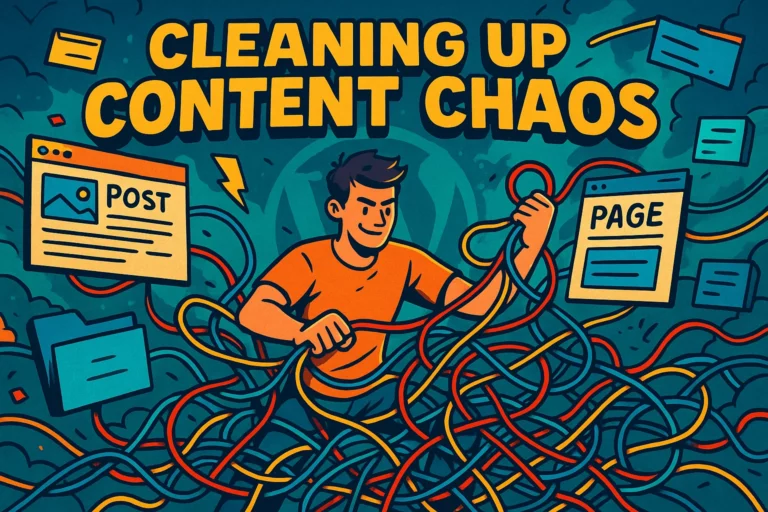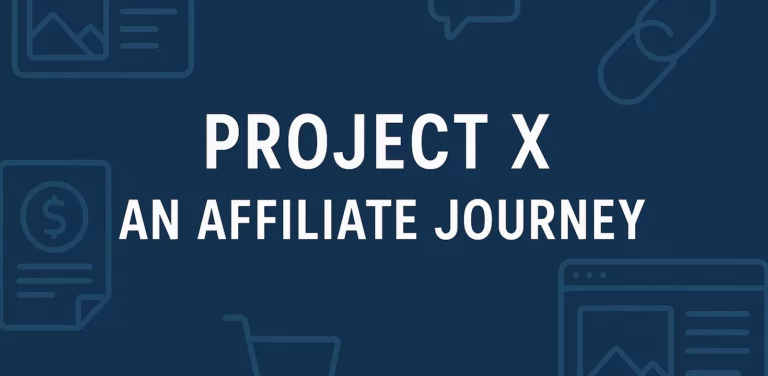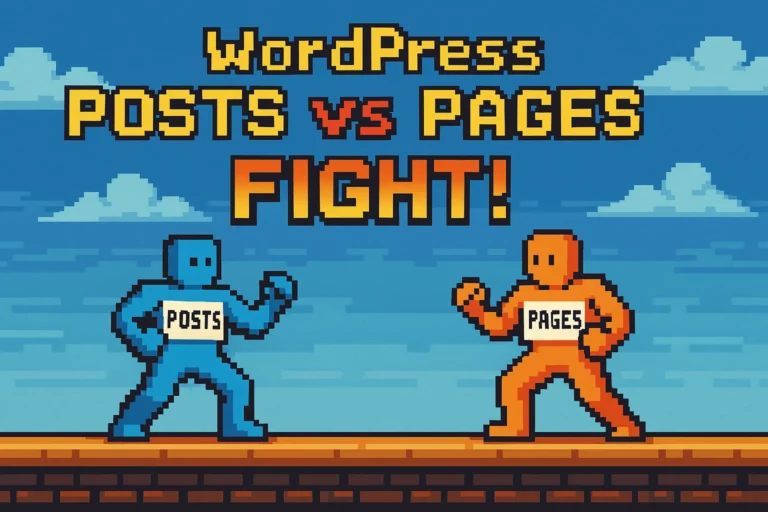Google: The Helpful Content Update & WordPress-Related Content
Before I start, I want to go on the record and say the following: I am not an SEO, and this is just my opinion, whether you agree or not, well, that’s down to you.
Picture it August, the 18th to be exact, Google releases a statement entitled: “What creators should know about Google’s helpful content update”. Whenever the big G, posts something on their blog, I can only imagine the shivers running down some people’s backs.
<Insert Jordan Peele Sweating GIF here>
Oh, WTF is it now, or will I lose traffic in the next Google update. Alarm bells sound out, and people prepare for the worst. This one is a little different, and dare I say it, it’s about time.
I’ll explain.
WordPress blogs gaming the SERPs
Blogs about WordPress, (some, not all) have been gleefully playing the SERPs, with crappy content geared for search engines. We all know who the main offenders are.
We dare not speak out, for fear of reprisals, or fanboys piping up and vehemently siding with those who practice the above. It’s been a bugbear of mine for many a year, and it harms new users looking at WordPress for their website.
Well, things are going to change.
Reading through the Googles HCU post
If you haven’t seen the post, take a look here. I’ll pick out a few points from the statement, and how it could impact WordPress blogs about WordPress.
Google: Focus on people-first content
Leafing through, one of the things that stands out immediately is the following:
“Does your content clearly demonstrate first-hand expertise and a depth of knowledge (for example, expertise that comes from having actually used a product or service, or visiting a place)?”
Google HCU Post
Let’s look at this one and how it could impact those blogs. Well, I can tell you that some blogs don’t actually use the products they review. I know, sounds stupid, right?
I’ve seen it first hand, and I’m not going to name names, I’ve been there and done that, and felt the wrath. It happens, some bloggers skim the documentation, take a couple of screenshots and merely list features, spin the content in a way to make it look like they’ve used it.
I’ll hammer this home again, “expertise from having actually used a product or service”. If you haven’t used a WordPress product, you have no right to review it.
None, it’s misleading to visitors. Not to mention the harm it does to consumers, who buy/download a product, based on said review.
Dare I say it? It harms WordPress product owners as well. If you’ve sent a product to a site for a review, you expect a review. Not a shambolic piece, that’s highlighting specific keywords that match your product.
What if a product owner’s plugin or theme has faults? Faults they weren’t aware of (believe me this does happen) what then? Pack your bags, you’re heading for “refund city”.
The damage this can cause a WordPress business owner is irreparable. Nothing harms sales more than word of mouth, especially if a customer has been led down the garden path with a false review.
Has your content helped?
“After reading your content, will someone leave feeling they’ve learned enough about a topic to help achieve their goal?”
Google HCU Post
If you’ve written a thinly veiled affiliate piece, purely to leverage a search term to generate revenue, I’d think again. Google is really pushing its helpful content update, and for those who practice this, I think you need to take a step back, and prioritize.
If a user sees no value in your article, they’re gone. If it happens, over and over again, visitor clicks and leaves, well, why the hell would Google keep your content in a higher position?
It wants content that helps people, not a sales pitch purely for making bank from an affiliate program.
Search engines first, forget about it
As part of the HCU update post, Google lists things you should avoid doing, and this is a big one, so hold onto your hats people.
“Is the content primarily to attract people from search engines, rather than made for humans?”
Google HCU Post
This leads me on to list posts. I’ve never been a fan of them. If you want to see a real world example of me tearing one apart, here you go.
While some list posts can actually be quite valuable, they’re usually the ones that have in-depth knowledge of the products they’re covering. I.e. they’ve used them.
Unfortunately in WordPress?
Well, quite the opposite. It’s just a case of listing plugins/themes in order of the highest affiliate payout. Or (and I hate this) how much a product owner has paid to be part of said “list”.
How many times have you seen “best plugin”, “best theme”, “best plugin for social media 2022”, or the classics, such as “best WordPress themes for bloggers in 2022”.
Hell, I don’t have to tell you that content isn’t written for users, it’s written for search engines.
The more shallow bloggers, delight in high rankings for list posts, hell some WordPress product owners even list their own products as best alternatives to XYZ, which to be honest is just a sad marketing tactic.
Are you mainly summarizing what others have to say without adding much value?
Google HCU Post
This is rife in WP land, and if you’re doing it, stop. Or keep doing it, actually keep doing it, other blogs who actually care about their visitors, will reap the rewards of writing content that helps.
“Does your content leave readers feeling like they need to search again to get better information from other sources?”
Google HCU Post
When it comes to WordPress, it’s a veritable sh&t show. The top results for a large percentage of searches are product led. Mainly list posts (by the same people or a network of sites interlinked by products), or content generated to make you buy a product, with ours is better than theirs approach.
It’s heartbreaking to be honest, and I can see why some don’t touch WP with a barge pole, I don’t blame them.
What about AI content?
This is where it gets interesting, and I’m speculating here, so bear with me:
“Are you using extensive automation to produce content on many topics?”
Google HCU Post
Using Artificial Intelligence for writing is not a bad thing. Note the words “extensive automation”. This is important. With the advent of AI for writing content, many are seeking ways to write long form content (I’ve looked into it for my own use), for me, I think this falls into “extensive automation”.
I couldn’t tell you which blogs about WordPress are using these, but my advice, take it or leave it, is this:
If you’re going to use AI content in blog posts, use it as a guideline, do not ask an AI to write 1200 words etc. and post the article. This could lead to problems further down the road. Again, I’m speculating, I’m not saying AI is a bad thing, far from it.
It can be incredibly useful for writing content, just don’t over do it, and fill your blog with AI articles!
How will this impact those looking into using WordPress?
I see this as an absolute win for those thinking of using WordPress. Quality content, answering their questions about WP. Instead of the proverbial shouting match that is the state of WordPress related Google searches currently.
This could help attract new people, strengthen the WordPress community, foster new talent, and grow. Which let’s face it is what most of us truly want.
How will this impact WordPress business owners?
Again, this is just my opinion, so take it with a pinch of salt. Mind you, that being said, I was right on one thing a while ago, so maybe I can see the future?
Bad news / good news
As a WordPress business owner, I’d be worried about this latest update. As much as most WordPress related list posts are junk, they’re going to suffer from lack of exposure. I don’t agree with list posts from a consumer point of view, but I understand why some businesses pay to play on them.
This is either good news or bad news. Bad news if you’ve paid $$$ to be a part of a list post, they could end up being further down the rankings, and you could end up out of pocket.
Good news for business owners, sick of other companies buying their way to the top.
Bad news: It will make business owners rethink their whole written content strategy. This in turn could lead to an increase in prices from content writers. With more work required to create content, this is going to hurt some companies’ pockets.
Good news: Better content will help business owners get further up the rankings, and actually answer queries and generate business, build trust and hopefully a user base.
I think we’ll see a shift in content relating to WordPress, and I for one hope this works. Not for my benefit, but for users. We want people to use WordPress, we want the community to grow, attract new users, with awesome content. This is why I got into WordPress, this is why I love writing about it.
I love finding out new things about WordPress products, writing reviews, offering tips and what not. It’s a passion. This latest update could help other WordPress blogs that offer quality content, it’s been a long time coming, but hopefully there will be light at the end of the tunnel.
Over to you
Are you a WordPress business owner? Worried about the update? Or perhaps you think it’s a good thing? I’d love to hear from you, so leave a comment, let’s have chat.
Till next time, take care.
All quotes taken directly from the Google Search Central Blog.
Subscribe To My Newsletter





